Sound: 









Value: 









(Read about our ratings)
 This is my last headphone review of 2024, and while I didn’t plan it this way, it’s ending the year with a bang. Can bangs be comfortable? Can bangs be beautifully detailed with an enormous soundstage? The metaphor breaks down here a bit, clearly. Which is to say, the Beyerdynamic DT 1990 Pro MkIIs ($599.99, all prices USD) are one of my favorite headphones I’ve heard this year.
This is my last headphone review of 2024, and while I didn’t plan it this way, it’s ending the year with a bang. Can bangs be comfortable? Can bangs be beautifully detailed with an enormous soundstage? The metaphor breaks down here a bit, clearly. Which is to say, the Beyerdynamic DT 1990 Pro MkIIs ($599.99, all prices USD) are one of my favorite headphones I’ve heard this year.
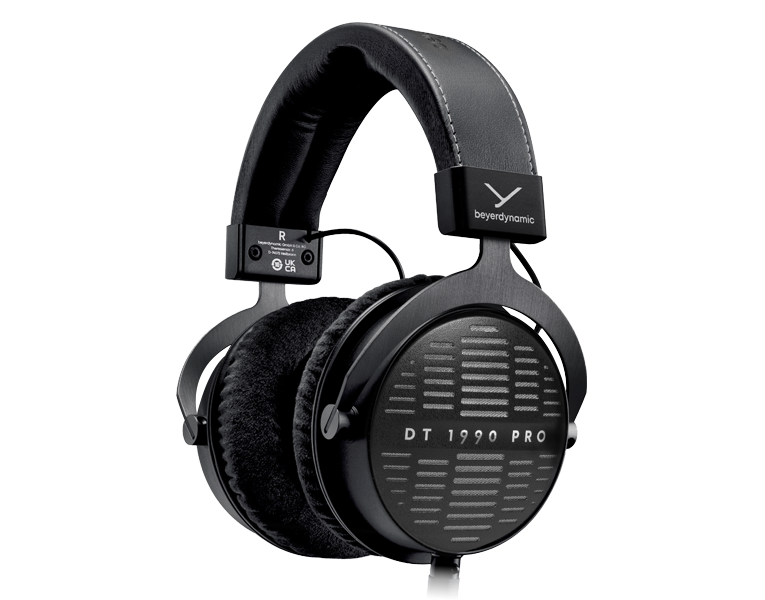
Aesthetically, the DT 1990 Pro MkII headphones are unmistakably Beyerdynamic, with big round cups and vents on the side that would make a 1958 Plymouth jealous. Inside are big 45mm dynamic drivers. Ostensibly for studio use, they’re (spoiler) enjoyable enough that they shouldn’t just be considered for audio professionals.
In the box
You get a lot in the box, which is great. Sporting a matte-black finish, the hard-shell case looks cool, but it’s far too large for convenient travel. Two cables are included, one 5m (16.4′) coiled and one 3m (9.8′) straight, both with 3.5mm jacks on one end and a mini-XLR connector that attaches to the left earcup on the other. A 3.5mm-to-6.35mm (1/4″) adapter is included.
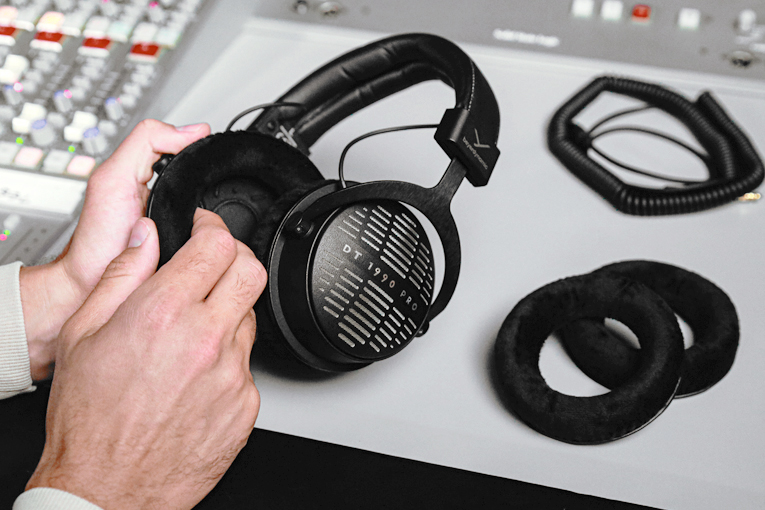
Perhaps most interesting are the two pairs of earpads. As Beyerdynamic explains on their website, “The ‘Producing Velours’ fitted as standard deliver a full sound thanks to a slight bass boost. The ‘Mixing & Mastering Velours’ offer a more analytical sound.” We’ll see about that. The pads look the same on the outside, and both are Squishmallow soft.
Use
The DT 1990 Pro MkIIs are very comfortable. They don’t feel like they weigh 376gm. The top of the earcups press in a bit, but I’d imagine that would loosen up over time. I thought the headband could use a bit more padding, but that’s at least partly due to my own complete lack of padding up top.
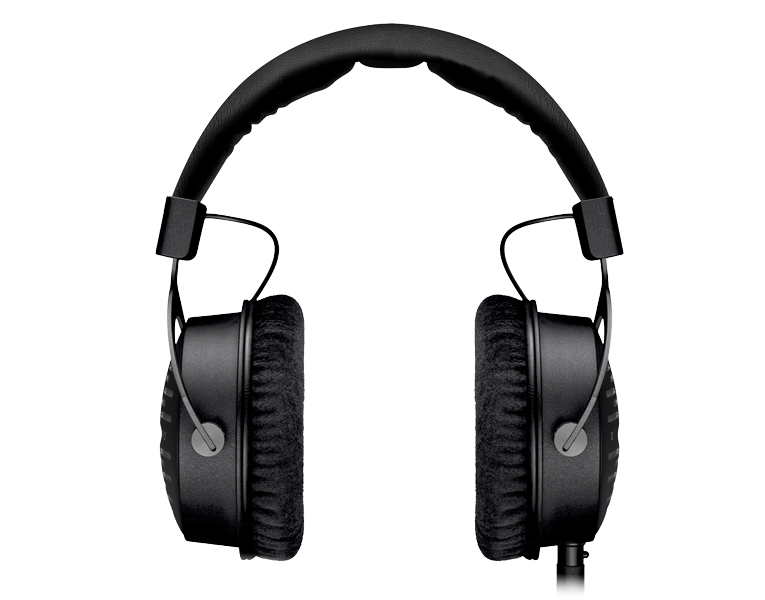
Overall, they feel pretty rugged, like they could handle getting tossed around a little in a studio. Not as indestructible as, say, the Sony MDR-7506 headphones, but they don’t feel fragile.
Sound
The DT 1990 Pro MkIIs are bright, lively headphones with a boost in the treble, a smaller boost in the bass, and an overall huge sound.
On the title track of David Bowie’s The Man Who Sold the World (24-bit/192kHz FLAC, Parlophone Records / Qobuz), the soundstage was enormous. The guitar was far out over my left shoulder, the percussion closer in, with everything placed within an extremely engaging sphere of sound. Each instrument’s timbre was more realistic than I’ve heard with most dynamic-driver headphones. While there’s definitely a boost in the treble, it was exceptionally clean. I never found them fatiguing or annoying to listen to (and I’m not typically a fan of lots of treble). It didn’t sound like there were significant or egregious spikes in higher frequencies, just an upward tilt starting in the upper midrange.
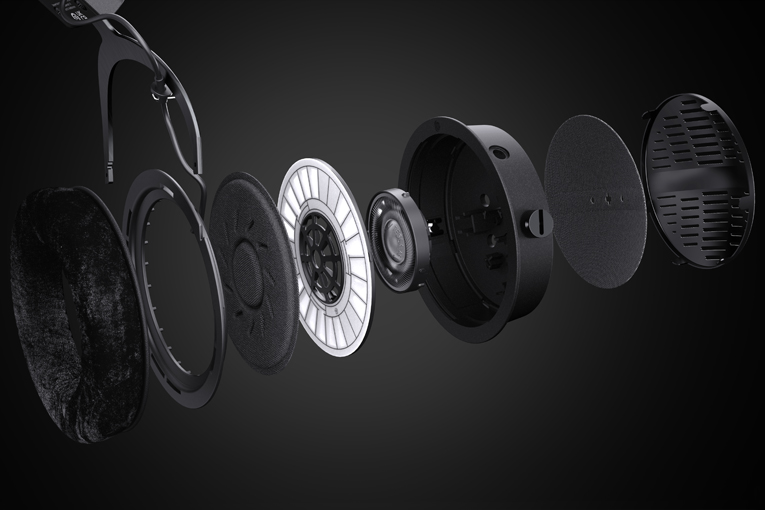
I found myself revisiting old favorites, always a good sign when reviewing new headphones. I let the opening organ of the Who’s “Baba O’Riley” (Who’s Next, 24/96 FLAC, Geffen Records / Qobuz) bounce around from shoulder to shoulder. Pete Townshend’s guitar growled on my right shoulder, and yet, Roger Daltrey’s voice was solidly in the center. There was no trace of sibilance. Acoustic guitars, like at the beginning of “Behind Blue Eyes” later on the album, were beautifully detailed and clear.
While treble is definitely the star of the show with the DT 1990 Pro MkIIs, there is enough bass that they don’t sound empty. For instance, John Entwistle’s bass on “Behind Blue Eyes” never got lost among the guitars, vocals, and of course, Keith Moon’s percussion.
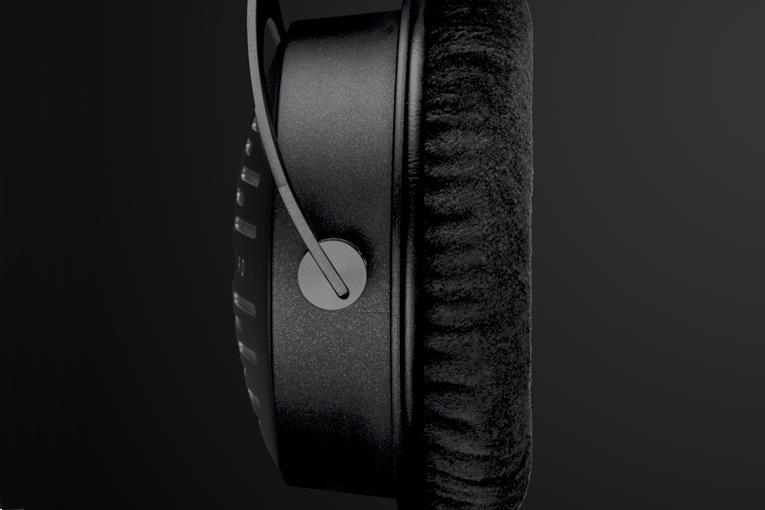
Switching to something that benefits from big bass, “The Mother We Share” from Chvrches’ The Bones of What You Believe (16/44.1 FLAC, Glassnote – VMG / Qobuz) certainly had plenty of snap in the percussion. Lauren Mayberry’s voice wasn’t overwhelmed by the drums and synths, but it wasn’t as present as I’ve heard elsewhere. However, there was plenty of bass to keep this track moving. It extended fairly deep, but was never what I’d call “warm.” On an imaginary EQ, I’d describe the DT 1990 Pro MkIIs as +2 treble, +1 bass, though the specifics aren’t quite as simple as that description.
I was able to get a decent volume out of the Pro MkIIs even with the Sony NW-A306, though fully maxed it was more “comfortably loud” than “yikes, I should turn this down.” If you’re spending $600 on headphones, they deserve some better power. The Schiit Audio Magni supplied plenty.
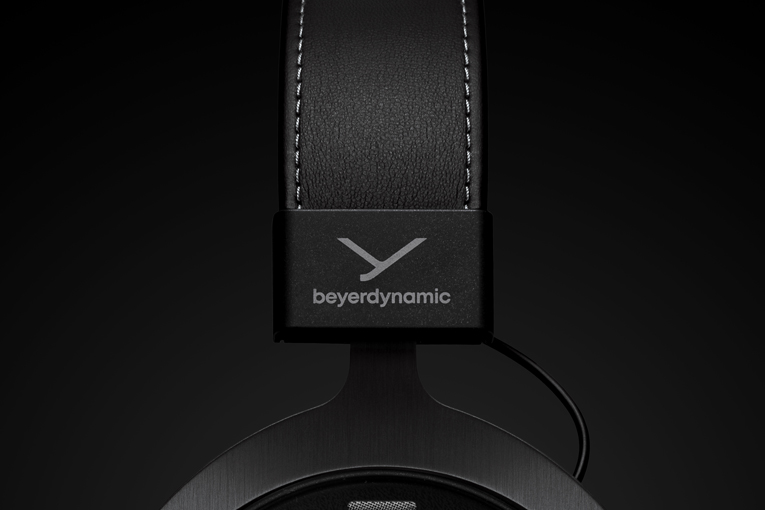
Switching the earpads seems straightforward enough: pull them off the earcups, then thread the new pads into a groove. It’s a simple design, but not a good one. It’s a bit too fiddly. Don’t expect to quickly swap back and forth. After much annoyance, I mounted the Mixing & Mastering Velours and repeated the above tracks. Since it’s impossible to do this quickly, and therefore effectively A/B the difference, I wouldn’t swear by the results. However, with the M&M Velours, the Pro MkIIs did seem to have less bass—enough so that if these were the stock (and only) pads, I wouldn’t have liked the Pro MkIIs as much. How is this possible? Well, the pads look the same on the side that touches your head, but on the side that faces the earcups, the M&Ms have a more solid face, with fewer vents, compared to the Producing Velours. So more sound goes through the pads to your ears. Not a lot judging by their size, but it does seem to change the sound.
Comparison
Despite their price difference, I thought it worthwhile to compare the DT 1990 Pro MkIIs to the Meze Audio 105 AER headphones ($399). They’re both great-sounding headphones but go about it in two very different ways. The AERs are a little mellow compared to the Pro MkIIs. With “Lust for Life” from Iggy Pop’s album of the same name (24/96 FLAC, Virgin Records / Qobuz), the constant tambourine and cymbals throughout were certainly plenty noticeable through the AERs, but brighter and more open through the Beyers. The Beyers sounded more open in general, with a far larger soundstage. The Mezes’ bass was a bit fuller overall, though bass drums had more kick (is that a pun?) through the Beyers.
Given their performance, I felt the only other comparison was to focus up the headphone food chain a bit. Brent loved the third-gen Beyerdynamic T5 headphones when he reviewed them in 2020. They’ve fallen from their launch price of $1000 to $700, so they’re roughly in the same ballpark as the DT 1990 Pro MkIIs. The T5s are smaller and, at 360gm, very slightly lighter than the Pro MkIIs. Those with larger ears might find the T5s’ deep but smaller-diameter earcups less comfortable than the larger-diameter ones of the DT 1990s. Even for my average-sized ears, the T5s border on being on-ear headphones.
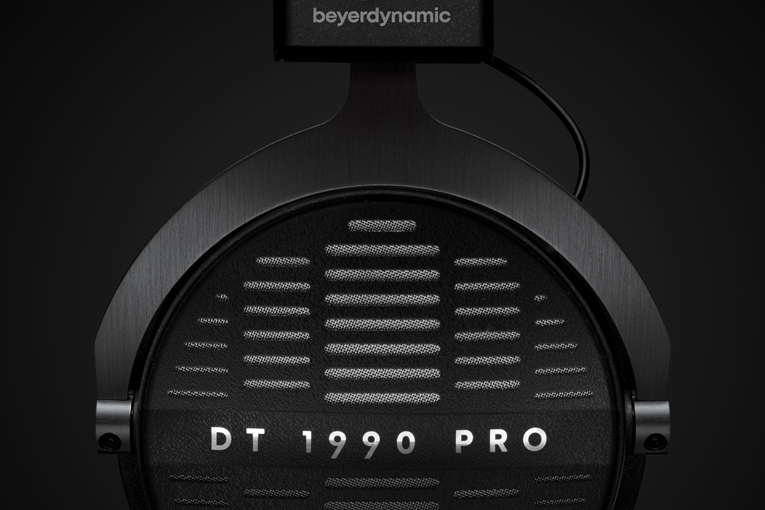
I’d describe the sound of the T5s as a little better balanced than the Pro MkIIs. There’s a little less treble, and a little less bass. That makes them less exciting to listen to, to be honest. The Pro MkIIs have more sparkle, and of course being open, they have a much larger sound than the closed-back T5s. Their better midrange was noticeable on the above Chvrches track where Mayberry’s voice was higher and more present in the mix. Perhaps ironically, I’d say the T5s might be the better option to create an audio mix, given their more balanced sound, but for something to listen to for fun, I’d pick the DT 1990 Pro MkIIs.
Conclusion
Despite being a notorious bass enthusiast, I loved the DT 1990 Pro MkII headphones. They unquestionably have a boost in the treble, but it’s done so well it’s hard to fault. There’s enough bass to keep it balanced. I’ve given these one of the highest ratings of any pair of headphones I’ve reviewed for SoundStage! Solo. The only ones I ranked higher were the Yamaha YH-5000SE headphones, which cost over eight times more than the DT 1990 MkIIs. So yeah, what a way to close out 2024. These are great.
. . . Geoffrey Morrison
Associated Equipment
- PC: iBuyPower Windows 10
- DAC/headphone amplifier: Schiit Audio Magni
- Portable media player: Sony NW-A306
Beyerdynamic DT 1990 Pro MkII headphones
Price: $599.99
Warranty: Two years
Beyerdynamic, Inc. USA
56 Central Avenue
Farmingdale, NY 11735
Phone: (631) 293-3200
Fax: (631) 293-3288
Email:
Website: www.beyerdynamic-usa.com




